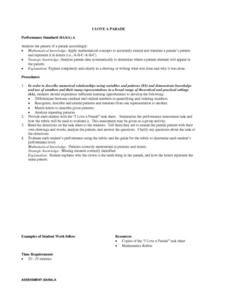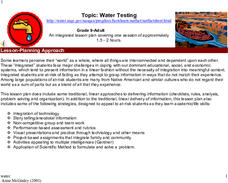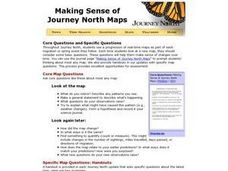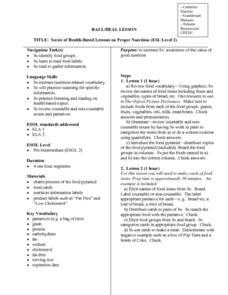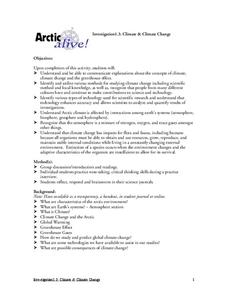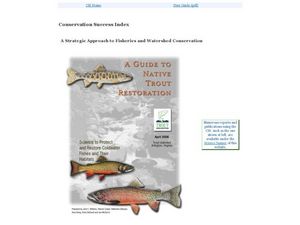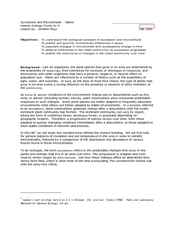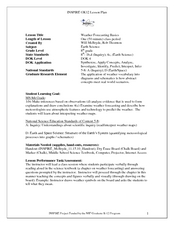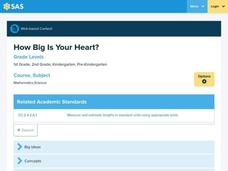Curated OER
Greenhouse Effect
Students identify greenhouse gases. They explain why perfluorocarbons are a bad alternative to chlorofluorcarbons. They determine both the least and most influential greenhouse gases.
Curated OER
Water Quality Monitoring
Young scholars work together to gather water samples. They compare and contrast the water quality from different places in the community. They answer discussion questions to complete the lesson.
Curated OER
Rotation Sensor Challenge
Students participate in a challenge to construct a rotation sensor with the highest degree of accuracy and repeatability. They conduct computer analysis of their sensor using repeated trial.
Curated OER
I Love a Parade
Students receive a worksheet that describes a parade. They tell what the 10th item in the parade will be. Students draw the parade, and tell the pattern they see using letters. Students design their own parade with the same pattern. They...
Curated OER
Molar Ratio
Students conduct an experiment in which they react sodium bicarbonate with hydrochloric acid to determine the molar ration between the two reactants. Students must write correct formula and a balanced chemical equation and explain how...
Curated OER
Water Testing
Students work together to design their own experiment to test developed hypothesis about the minerals in water. As a class, they discuss the main components of water quality and describe the chemistry behind the hardness assay. They...
Curated OER
Making Sense of Journey North Maps
Students use maps and answer core curriculum questions in order to increase comprehension and practice higher order thinking skills. This helps them develop writing skills through the practice of keeping Science Journals.
Curated OER
Our Schoolsyard is Full of Biology
Students study the habitats found in their schoolyard. They apply firsthand, what they have learned in the classroom to something familiar to them. Students look at biotic, abiotic habitats. Small groups will present their findings to...
Curated OER
The Mathematics of Space and Place
Students investigate the measurements and geometry of the school grounds. They conduct inquiry while measuring the campus and some of the city blocks. Then students draw a map to scale and categorize property types using a pie graph.
Curated OER
Watershed Analysis
Students conduct a regional watershed analysis of an area of their choosing. Using on-line data and their personal knowledge of the area, they determine the annual hydrologic budget and teach the class about "their" watershed.
Curated OER
Carpooling and the Environment
Students investigate carpooling and determine to what extent it occurs in their community for a carpool challenge. In groups, students create a survey then collect, calculate and record data to determine how much pollution could be...
Curated OER
Wind Distribution of Weed Seeds
Students investigate how many seasons it would take for wind to disperse seeds one mile downwind from an initial growth of one spotted knapweed plant. They construct and use a wind tunnel as part of their experiment and graph their results.
Curated OER
Hall/ Heal Lesson
Students review the food groups and vocabulary in order to define how good nutrition is part of good health. They read a variety of articles in order to better understand the concept and develop reading comprehension at the same time.
Curated OER
Sea Ice Research
Students study sea ice and its importance in climate and climate change. They discuss sea ice as a presence of a food source for marine animals in the arctic and complete a lab activity. After completing the lab, they watch a video...
Curated OER
Environment: Climate Change
Students explore climate change and the greenhouse effect. Using provided definitions, they assess local weather conditions and analyze long term climatic data for their areas. Once they explore the concept of and connection between...
Curated OER
Conservation Success Index
Students read information about trout habitat preservation and visit the various links to learn a fish species and its current habitat range. In this habitat conservation lesson plan, students read passages about use the Trout Unlimited...
Curated OER
Succession and Microclimate
Students compare the population of insects in different microclimates. In this biology lesson, students collect data using probes to tabulate temperature and soil data. They predict how certain parameters change as an area goes through...
Curated OER
Welcome to Populations!
Students define what population is in their own words. In this biology lesson, students explain different ways to measure population density. They interpret population graphs.
Curated OER
Weather Forecasting Basics
Eighth graders analyze weather diagrams and weather maps. In this earth science lesson, 8th graders explain why it is important to know the weather. They complete a handout at the end of the lesson.
Curated OER
How Big Is Your Heart?
Students complete a performance about the heart. For this heart lesson plan, students learn about the heart functions and then perform them.
Pennsylvania Department of Education
Seeing Doubles
Learners work with dominoes to recognize the number of spots on each side as they relate to addition facts. In this seeing doubles lesson, students make triangle shaped flash cards for the double facts. Learners represent the correct...
Other popular searches
- Noun Quantifiers
- Grammar Quantifiers
- Quantifiers Some and Any
- Quantifiers in Context
- Quantifiers; Some and Any
- Determiners and Quantifiers
- Quantifiers and Nouns
- Esl Quantifiers
- Quantifiers Nouns
- Math Quantifiers
- Esl Lessons Quantifier
- Quantifiers All or Some





